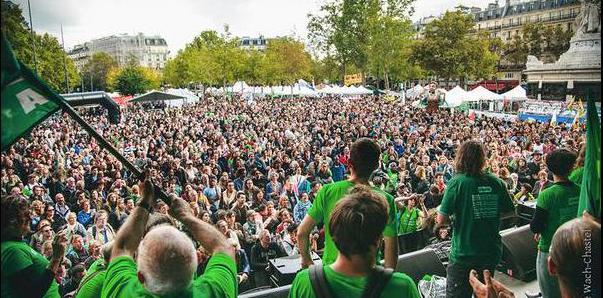Conference of Parties (COP) is an annual meeting among the countries of the United Nations Framework on Climate Change (UNFCCC). This year’s meeting, COP21, will be held in Paris with a total of 195 nations and over 40,000 delegates in attendance. The purpose of the annual meeting is to assess each nation’s progress in addressing climate change, and negotiate agreements and goals for reducing greenhouse gas emissions.
We are all too familiar with national failure to meet targets that have emerged from these conferences. When Canada failed to meet carbon cuts set in the Kyoto Protocol at COP3, a treaty that Canada ratified under its previous government 18 years ago, climate change skeptic Stephen Harper simply withdrew Canada from the commitments. Every change in the national government promises a change in the proposed targets. This represents a grave danger, which underlies the weak nature of past negotiations. A failure to transform COP negotiations into meaningful action leads to profound doubt in the resolve of international leaders.
COP21 has a clear and vital goal: all nations must unanimously adopt a legally binding agreement that will enable nations to effectively combat climate change and keep warming below the 2-degree threshold. Each nation has been required to publish its national contribution to the global effort prior to COP21. The agreements that unfold must boost the global transition towards resilient, low-carbon societies and economies.
At COP20 held in Lima, Peru, governments in attendance set foundations for what is envisioned to be a binding contract for all nations. The global deal is supposed to be finalized and approved at COP21 and is said to take effect in 2020.
A monotonous history of allowing member countries to set their own goals, with neither compulsory agreements nor international mechanisms to impose such targets, makes it difficult to foresee a serious resolution resulting from these conferences alone. After two decades of annually organized negotiations, many of which are today deemed as failures, there is apprehension regarding the efficacy and capability of change from within. As a result, actors of civil society have emerged in mass, with an alternative approach.
Coalition Climat 21 is composed of more than 130 organizations and movements that have mobilized due to the successive governmental failures to reach an agreement and to tackle the climate crisis. Comprised of unions, environmental and international solidarity NGOs, faith groups, and youth movements, the Coalition is seizing COP21 as a decisive opportunity to organize meetings and demonstrations for climate justice.
On October 5th and 6th, hundreds of international activists in association with Coalition Climat 21 met to discuss action that will be undertaken in light of COP21, ranging from massive demonstrations to panel discussions. Key events include the People’s Climate March on November 29, Action Day for the Climate on December 12, and a large Citizen Summit for the Climate on December 5th and 6th.
Predictions of mass mobilization have not gone unnoticed by the UNFCCC. Their official webpage entitled “COP21 Main Issues” states:
“many initiatives are currently being developed by a range of non-governmental stakeholders: cities, regions, businesses, associations, and so on. This is known as the Agenda of Solutions. Since the New York Climate Summit of September 2014, there has been a growing trend towards concrete action, exchange of best practices and knowledge transfer. These initiatives will supplement States’ commitments, raise awareness of economic and social opportunities, and thus help to strengthen individual ambitions”
According to the UNFCCC, the aim is to include non-State actors in the transition towards a global solution for low-carbon societies and economies. They claim that COP21 will provide an opportunity for public stakeholders to engage in negotiations and defend their respective positions. However, their vague interest in involving new actors seems contradictory and insubstantial in light of recent actions by the French government.
The French government is reintroducing border controls over the period of COP21. This is an exceptional measure typically taken when there is a perceived “threat to public policy or internal security”. Based on Articles 23 and 24 of the Schengen Borders Code, between November 30th and December 11th, even EU citizens will be unable to move freely in and out of France. According to a document published by the Council of the European Union, controls will be reintroduced at borders with Belgium, Luxembourg, Germany, the Swiss Confederation, Italy, and Spain during COP21. Any time border controls have been reintroduced in the past it has been for the purpose of security and crime prevention.
State-actors are interested in the involvement of NGOs and civil society actors so long as they are held on a tight leash. Undeterred, more than 10,000 civil society representatives coming from all over the world have already submitted accommodation requests to Coalition Climat 21. Seemingly ironic is the fact that while the French government ramps up its national security, what could simultaneously unfold come December, is an anemic response to today’s most serious threat to global security.
However, through mass mobilization, citizens from all over the world are determined to push COP21 beyond an amalgam of decisions made between state leaders behind closed doors. It is essential that governments and global corporations are deeply challenged in order to create a future marked by increased transparency, equity, and climate justice. Especially since the issues being tackled are ones that profoundly affect every citizen, globally.
References:
http://cadtm.org/Are-Climate-Advocates-not-Welcome
https://canadiandimension.com/articles/view/from-failure20-to-cop21
http://coalitionclimat21.org/en/contenu/coalition
http://coalitionclimat21.org/sites/default/files/mob_cop21_-_en_2.pdf
http://www.cop21.gouv.fr/en/cop21-cmp11/cop21-main-issues
http://www.huffingtonpost.com/iain-patton/mobilizing-the-masses-aro_b_8147264.html
http://time.com/4080073/canada-climate-change-justin-trudeau/
http://www.transform-network.net/blog/blog-2015/news/detail/Blog/system-change-not-climate-change-citizens-voices-and-cop21.html
 Log in
Log in









